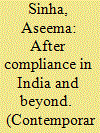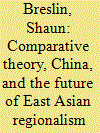| Srl | Item |
| 1 |
ID:
185096


|
|
|
|
|
| Summary/Abstract |
Using India as a theory building case, this paper puts forward a theoretical framework for understanding countries’ responses to global rules and implementation effects across diverse global governance regimes and contexts. The initial premise for this paper is that the strategic structure of implementation dilemmas faced by states and actors within countries need to be understood in addition to design dilemmas. Successful global regimes must not only solve cooperation and uncertainty problems at the initial stages in choosing the right institutional matrix, but also ‘require changes in domestic institutions.’ The need to change domestic institutions creates certain implementation dilemmas. These dilemmas are a joint product of the institutional design, specific policy issue and the domestic logic of responses after international agreements have been signed. This broader idea helps understand a wide variety of India’s interactions across global governance institutions. I also suggest a novel empirical strategy of cross-institutional analysis to assess implementation dilemmas. While we have numerous cross-national studies of how compliance occurs in a wide variety of countries, we lack theory-driven, empirically grounded, comparative studies of a single country or a group of countries across diverse global regimes. Such a framework can help us better understand how countries interact with a variety of global institutions and the reciprocal effects. This framework is then used to understand India’s interactions with diverse global regimes in an illustrative manner in this article, and in greater detail by other authors in the section published in this issue of Contemporary South Asia.
|
|
|
|
|
|
|
|
|
|
|
|
|
|
|
|
| 2 |
ID:
097921


|
|
|
|
|
| Publication |
2010.
|
| Summary/Abstract |
Despite the development of an increasingly sophisticated literature on comparative regional integration drawing from a variety of cases, the European experience remains the most often used benchmark against which other integrative processes are judged; there is still an often implicit expectation that 'successful' processes of regionalism will end up looking something like the European Union. While it is correct to move away from such a 'Euro-dominance', the theoretical lessons learned continue to have salience when applied to emerging and competing forms of integrative processes in East Asia. In particular, when economic considerations dominate regional relations - at times of economic crises - then integrative logics and strategies come to the fore. In more 'normal' times when geo-strategic considerations reassert themselves, then the consensus over region building and the very nature of the region itself is weakened and cooperation is replaced by competing visions and the over-supply of region.
|
|
|
|
|
|
|
|
|
|
|
|
|
|
|
|